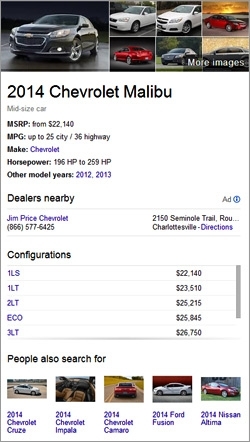Commentary
Google's Expandable Knowledge Graph Ads Will Change The Way Marketers Think About Search
- by Laurie Sullivan , Staff Writer @lauriesullivan, January 6, 2014
 The painstaking process of listing my dad's 2007 Toyota 4Runner on Edmunds.com and Craigslist after he passed away from brain cancer last year meant finding the perfect person to log
onto either one of the two platforms and search on the keywords "Toyota 4runner" to find the listing. After a few weeks I sold it for very close to the asking price, but what if that local ad placed
on Edmunds.com or Craigslist served up in Google, Bing or Yahoo search results after querying the keywords "2007 4Runner"?
The painstaking process of listing my dad's 2007 Toyota 4Runner on Edmunds.com and Craigslist after he passed away from brain cancer last year meant finding the perfect person to log
onto either one of the two platforms and search on the keywords "Toyota 4runner" to find the listing. After a few weeks I sold it for very close to the asking price, but what if that local ad placed
on Edmunds.com or Craigslist served up in Google, Bing or Yahoo search results after querying the keywords "2007 4Runner"?
Google has been testing ads in expandable Knowledge Graph listings. Marketing Mojo CEO Janet Driscoll Miller shares results from a Knowledge Graph search conducted based on a few keywords. The car was for sale through a local dealer -- Jim Price Chevrolet in Charlottesville, near her work. The description, such as price and availability, serves up in the results by searching on the keywords "Chevy Malibu" when in the local area.
A pivotal event in desktop and mobile search relies on the ability of consumers to find lists of local product prices and availability on the Internet. To understand the power of ads appearing in Google's Knowledge Graph, marketers must understand the Internet's impact on local business. To some it sounds simple, but in reality it's not.
Search on the words "Chevy Malibu." The Knowledge Graph serves up information on the car, such as manufacturer's suggested retail price, MPG and horsepower. An ad in the Knowledge Graph would provide information about a car in the area for sale. Pulling an ad from a local listing in Edmunds.com or Craigslist would make it easier for the buyer to sell the car and the seller to find the car. Changing the location would become as easy as typing in another city, county or state in the search query.
Driscoll Miller noticed the rollout in Knowledge Graph late last year. Similar to Google Shopping, Carmax, Edmund.com and Craigslist could run their local inventory in search query results through Knowledge Graph. The pitfall is that if Google placed the listing at the top of the page, it would push down the paid-search and product listing ads. Google would need to charge more -- and consider ads in the Knowledge Graph as premium placements.



